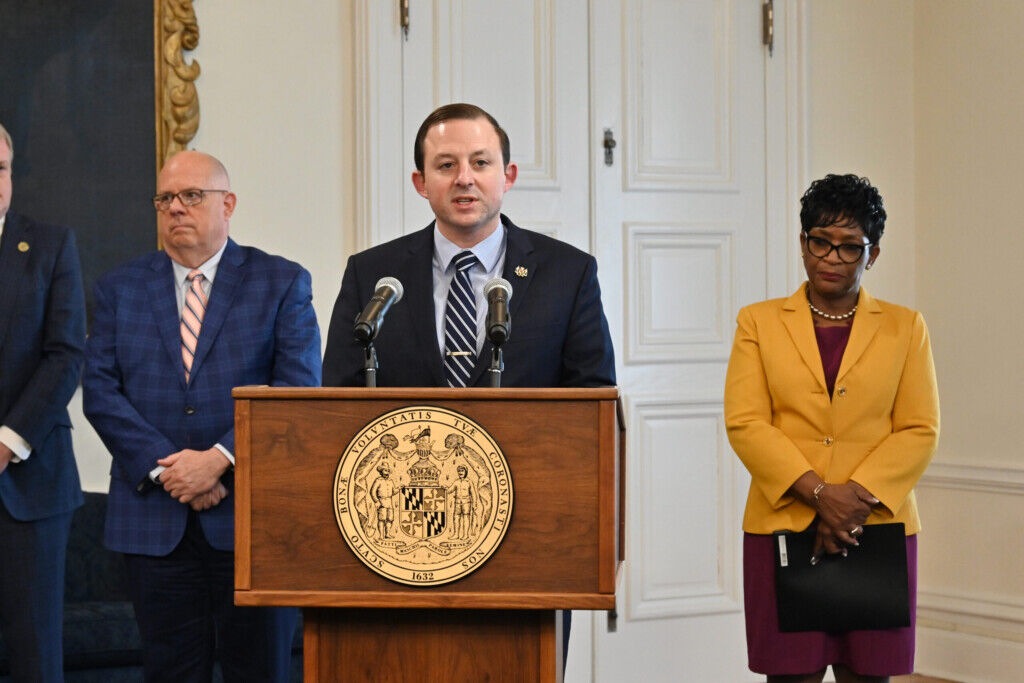This article was republished with permission from WTOP’s news partners at Maryland Matters. Sign up for Maryland Matters’ free email subscription today.

This content was republished with permission from WTOP’s news partners at Maryland Matters. Sign up for Maryland Matters’ free email subscription today.
The General Assembly’s presiding officers on Wednesday threw cold water on the notion of calling a special session to stop an automatic gas tax increase from taking effect July 1.
Comptroller Peter V.R. Franchot, a Democratic candidate for governor, urged the special session in a letter earlier this week to Gov. Lawrence J. Hogan Jr. (R), Senate President Bill Ferguson (D-Baltimore City) and House Speaker Adrienne A. Jones (D-Baltimore County).
If the presiding officers were inclined to call lawmakers back to Annapolis, they likely would have, but instead released a statement expressing doubts about the proposal to halt the mandated tax increase.
A bill passed by the legislature in 2013 established a formula calculated by the comptroller each year that ties the state’s gas tax rate to inflation. This year, that calculation would increase the rate by 6.6 cents per gallon, up to 42.7 cents per gallon.
Franchot opposed the bill when it was introduced and has urged state lawmakers to pursue a lengthy gas tax holiday — a month-long reprieve earlier this year ended in mid-April — as residents grapple with an increased cost of living.
The average price for regular gas in Maryland was $4.60 per gallon mid-afternoon Wednesday, same as the national average, according to AAA.
“We are all feeling the effects of surging gas prices, which have become a global problem and result from big oil taking advantage of global uncertainty to make record-shattering profits,” Ferguson and Jones said in a joint statement.
But, they added: “The suggested elimination of the six-cent per gallon inflation adjustment on wholesale gas purchases would not result in Marylanders seeing a price reduction at the pump [and] would be a loss of over $200 million in funding dedicated to ensuring the safety of our State’s roads and bridges.”
The state’s gas tax revenues are dedicated to the Transportation Trust Fund, which helps pay for road, highway and bridge projects. During the 30-day tax holiday in March and April, lawmakers used general funds to replenish the infrastructure account.
“Ensuring the safety and integrity of Maryland’s roadways, bridges, and transit systems is critical. We cannot have a reliable transportation network that regularly experiences failing conditions due to insufficient funding and deferred maintenance,” the presiding officers said Wednesday.
For days, Hogan’s office has suggested that Franchot has the authority to take unilateral action, while the comptroller has suggested that the legislature or Hogan must act.
The comptroller’s office also provided a legal advice letter, dated Wednesday, from Brian Oliner, the Office of the Attorney General’s principal counsel to the agency.
Hogan’s office has specifically pointed to other instances in which Franchot took action to minimize tax burdens in extraordinary circumstances, including during the COVID-19 pandemic and after natural disasters. However, in each of those cases, tax deadlines were delayed, but the levies ultimately remained in place.
Oliner’s letter states that the comptroller has “limited authority, when good cause is shown,” to grant extensions of tax deadlines, but that does not “grant a blanket waiver of any tax.”
State law “places a mandatory duty and responsibility upon the Comptroller to calculate, set, and collect the motor fuel tax and sales and use tax equivalent on motor fuel,” Oliner wrote. “The Comptroller has no independent authority to not use these specific formulas, to substitute some alternative approach, or to ignore the laws altogether.”







